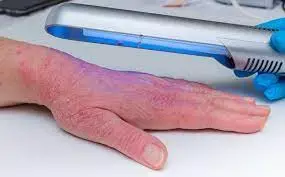- Home
- Medical news & Guidelines
- Anesthesiology
- Cardiology and CTVS
- Critical Care
- Dentistry
- Dermatology
- Diabetes and Endocrinology
- ENT
- Gastroenterology
- Medicine
- Nephrology
- Neurology
- Obstretics-Gynaecology
- Oncology
- Ophthalmology
- Orthopaedics
- Pediatrics-Neonatology
- Psychiatry
- Pulmonology
- Radiology
- Surgery
- Urology
- Laboratory Medicine
- Diet
- Nursing
- Paramedical
- Physiotherapy
- Health news
- Fact Check
- Bone Health Fact Check
- Brain Health Fact Check
- Cancer Related Fact Check
- Child Care Fact Check
- Dental and oral health fact check
- Diabetes and metabolic health fact check
- Diet and Nutrition Fact Check
- Eye and ENT Care Fact Check
- Fitness fact check
- Gut health fact check
- Heart health fact check
- Kidney health fact check
- Medical education fact check
- Men's health fact check
- Respiratory fact check
- Skin and hair care fact check
- Vaccine and Immunization fact check
- Women's health fact check
- AYUSH
- State News
- Andaman and Nicobar Islands
- Andhra Pradesh
- Arunachal Pradesh
- Assam
- Bihar
- Chandigarh
- Chattisgarh
- Dadra and Nagar Haveli
- Daman and Diu
- Delhi
- Goa
- Gujarat
- Haryana
- Himachal Pradesh
- Jammu & Kashmir
- Jharkhand
- Karnataka
- Kerala
- Ladakh
- Lakshadweep
- Madhya Pradesh
- Maharashtra
- Manipur
- Meghalaya
- Mizoram
- Nagaland
- Odisha
- Puducherry
- Punjab
- Rajasthan
- Sikkim
- Tamil Nadu
- Telangana
- Tripura
- Uttar Pradesh
- Uttrakhand
- West Bengal
- Medical Education
- Industry
Ultraviolet phototherapy does not increase risk of skin cancer in patients with atopic dermatitis

Ultraviolet phototherapy does not increase risk of skin cancer in patients with atopic dermatitis suggests a new study published in the Journal of the American Academy of Dermatology.
UV-B phototherapy is a common treatment modality for patients with atopic dermatitis (AD), but its long-term safety in terms of cutaneous carcinogenic risk has not been studied.
A study was done to investigate the risk of skin cancer among patients with AD receiving UV-B phototherapy.
Researchers conducted a nationwide population-based cohort study from 2001 to 2018 to estimate the risk of UV-B phototherapy for skin cancer, nonmelanoma skin cancer, and cutaneous melanoma in patients with AD.
Results
Among 6205 patients with AD, the risks of skin cancer (adjusted hazard ratio [HR], 0.91; 95% CI, 0.35-2.35), nonmelanoma skin cancer (adjusted HR, 0.80; 95% CI, 0.29-2.26), and cutaneous melanoma (adjusted HR, 0.80; 95% CI, 0.08-7.64) did not increase among patients with AD treated with UV-B phototherapy, compared with those who did not receive UV-B phototherapy. Additionally, the number of UV-B phototherapy sessions was not associated with an increased risk of skin cancer (adjusted HR, 0.99; 95% CI, 0.96-1.02), nonmelanoma skin cancer (adjusted HR, 0.99; 95% CI, 0.96-1.03), or cutaneous melanoma (adjusted HR, 0.94; 95% CI, 0.77-1.15).
Neither UV-B phototherapy nor the number of UV-B phototherapy sessions was associated with an increased risk of skin cancers among patients with AD.
Reference:
Mei-Ju Ko, MD, Wan-Chuan Tsai, Ping-Hsiu Tsai, Le-Yin Hsu, Kuo-Liong Chien, Hon-Yen Wu. Ultraviolet B phototherapy does not increase the risk of skin cancer among patients with atopic dermatitis: A population-based retrospective cohort study. Published:May 24, 2023DOI:https://doi.org/10.1016/j.jaad.2023.05.037
Keywords:
Ultraviolet, phototherapy, does not, increase, risk, skin, cancer, patients, atopic dermatitis, Journal of the American Academy of Dermatology, Mei-Ju Ko, MD, Wan-Chuan Tsai, Ping-Hsiu Tsai, Le-Yin Hsu, Kuo-Liong Chien, Hon-Yen Wu
Dr. Shravani Dali has completed her BDS from Pravara institute of medical sciences, loni. Following which she extensively worked in the healthcare sector for 2+ years. She has been actively involved in writing blogs in field of health and wellness. Currently she is pursuing her Masters of public health-health administration from Tata institute of social sciences. She can be contacted at editorial@medicaldialogues.in.
Dr Kamal Kant Kohli-MBBS, DTCD- a chest specialist with more than 30 years of practice and a flair for writing clinical articles, Dr Kamal Kant Kohli joined Medical Dialogues as a Chief Editor of Medical News. Besides writing articles, as an editor, he proofreads and verifies all the medical content published on Medical Dialogues including those coming from journals, studies,medical conferences,guidelines etc. Email: drkohli@medicaldialogues.in. Contact no. 011-43720751


